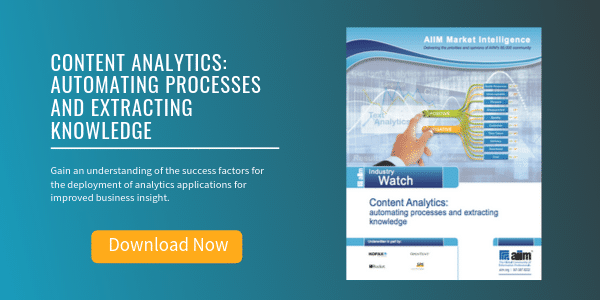
Content Analytics – What Does It Mean to YOUR Organization?
Deriving meaning and insight from the different forms of content held and managed within most organizations is fast becoming one of the number one challenges and priorities for many in business. AIIM’s June 2015 Industry Watch Content Analytics: automating processes and extracting knowledge, revealed that six in ten enterprises believe that content analytics will be essential within five years’ time:
The capacity of computers to recognize meaning in text, sound or images has progressed slowly and steadily over many years, but with the constant arrival of faster computing resources, and the continual refinement of software algorithms, we are in a position where both the speed and the accuracy of recognition can support a wide range of applications.
In particular, when we add analysis to recognition, we can match up content with rules and policies, detect unusual behavior, spot patterns, and trends, and infer emotions and sentiments. Content analytics is a key part of ‘big data’ business intelligence, but it is also driving auto-classification, content remediation and Information Governance, security correction, adaptive case management, and operations monitoring.
That smart content analytics can be of huge value to an organization is clear. But it is equally clear that there are a number of obstacles to content analytics adoption that need to be overcome. At the most recent meeting of AIIM’s think-tank, the Executive Leadership Council (ELC), the following obstacles were identified as particularly pertinent:
- Definitions of what content analytics actually is are poorly understood and inconsistent.
- There is still too much focus on technology and not enough on business value; who truly are the buyers, influencers, and key stakeholders and how are they different from those of yesteryear?
- The pace of technology change is accelerating and running ahead of the ability of organizations to consume it.
- There is an on-going lack of specific use cases to really demonstrate value.
- There is a splintering of data -- and data responsibility -- in the enterprise.
As with any emerging technology, there has been a wave of content analytics early adopters. The ELC agreed that it was imperative to learn strategic lessons from these early implementers, particularly focusing on:
- Addressing data structure, tagging, and permissions as close as possible to the point of creation.
- Defining a clear set of corporate objectives for content analytics initiatives.
- Always remember that the hardest part of a content analytics project is not the technology.
- Done right, content analytics should drive you to rethink the questions you ask about your organization.
- Position your content analytics initiatives as a means to both enhance customer value AND address information security.
In conclusion, a lot is happening in the world of content analytics, and it is happening very quickly, indeed. But organizations must embrace the changes and the pace at which they are happening, as content analytics takes its place at the heart of many organizations.
Per Vladimir Lenin: “There are decades in which nothing happens, and there are weeks in which a decade happens.” Per ELC Leader Thornton May: “The status quo is perpetually on trial. But that doesn’t mean you can stand by and wait. It wasn’t raining when Noah started building the ark.”
About John Mancini
John Mancini is the President of Content Results, LLC and the Past President of AIIM. He is a well-known author, speaker, and advisor on information management, digital transformation and intelligent automation. John is a frequent keynote speaker and author of more than 30 eBooks on a variety of topics. He can be found on Twitter, LinkedIn and Facebook as jmancini77. Recent keynote topics include: The Stairway to Digital Transformation Navigating Disruptive Waters — 4 Things You Need to Know to Build Your Digital Transformation Strategy Getting Ahead of the Digital Transformation Curve Viewing Information Management Through a New Lens Digital Disruption: 6 Strategies to Avoid Being “Blockbustered” Specialties: Keynote speaker and writer on AI, RPA, intelligent Information Management, Intelligent Automation and Digital Transformation. Consensus-building with Boards to create strategic focus, action, and accountability. Extensive public speaking and public relations work Conversant and experienced in major technology issues and trends. Expert on inbound and content marketing, particularly in an association environment and on the Hubspot platform. John is a Phi Beta Kappa graduate of the College of William and Mary, and holds an M.A. in Public Policy from the Woodrow Wilson School at Princeton University.



